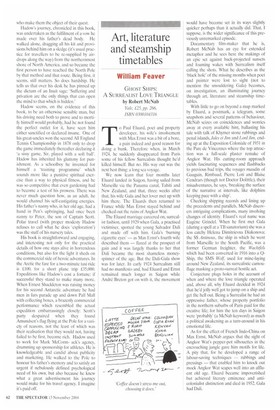Art, literature and steamship timetables
William Feaver
GHOST SHIPS: A SURREALIST LOVE TRIANGLE by Robert McNab Yale, £25, pp. 266, ISBN 0300104316 To Paul Eluard, poet and property developer, his wife's involvement with Max Ernst was a bit of a bore, a pain indeed and good reason for doing a bunk. Therefore when, in March 1924, he suddenly disappeared from Paris some of his fellow Surrealists thought he'd killed himself. But no. His way out was the next best thing: a long sea voyage.
We now learn that four months later Eluard landed in Saigon, having sailed from Marseille via the Panama canal, Tahiti and New Zealand, and that, three weeks after that, his wife Gala and her lover met up with him there. The Eluards then returned to France while Max Ernst stayed behind and checked out the ruins of Angkor Wat. The Eluard marriage careered on, surrealist fashion, until 1929 when Gala, a practised victimiser, spotted the young Salvador Dali and made off with him. Gala's 'burning cigarette eyes' — as Max Ernst's fourth wife described them — flared at the prospect of gain and it was largely thanks to her that Dali became the most shameless moneyspinner of the age. But the Dali-Gala show was for later. In early 1924 Surrealism still had no manifesto and, had Eluard and Ernst remained much longer in Saigon while Andre Breton got on with it, the movement would have become set in its ways slightly quicker perhaps than it actually did. That, I suppose, is the wider significance of this previously unremarked episode. Documentary film-maker that he is, Robert McNab has an eye for extended metaphor and he sees here the makings of an epic set against back-projected sunsets and foaming wakes with Surrealism itself calling the shots. What he describes as the 'black hole' of the missing months when poet and painter were lost to sight (not to mention the smouldering Gala) becomes, on investigation, an illuminating journey through art, literature and steamship timetables.
With little to go on beyond a map marked by Eluard, a postmark, a telegram, some snapshots and several patterns of behaviour, McNab seizes on coincidences and worries away at every available hint, ballasting his tale with talk of Khymer stone rubbings and penal islands, Jules et Jim and Lord Jim, ending up at the Exposition Coloniale of 1931 in the Parc de Vincennes where the top attraction was a full-scale plaster remake of Angkor Wat. His cutting-room approach yields fascinating sequences and flashbacks to previous had trips, the voyages maudits of Gauguin, Rimbaud, Pierre Lon and Blaise Cendrars (though not Doctor Dolittle), their misadventures, he says, 'breaking the surface of the narrative at intervals, like dolphins keeping pace with a ship'.
Checking shipping records and lining up the precedents and parallels, McNab discovers intriguing complications, many involving changes of identity. Eluard's real name was Eugene Grindel. When he first met Gala (during a spell at a TB sanatorium) she was a less catchy Helena Dimitrievna Diakonova; the SS Antinous, the ship in which he went from Marseille to the South Pacific, was a former German freighter, the Wachtfels which had been converted in 1916 into a Ship, the the SMS Wolf, used for mine-laying around New Zealand, its surrealistic camouflage masking a proto-surreal hostile act. Conjecture plugs holes in the account of when and where the love triangle operated and, above all, why Huard decided in 1924 that he'd jolly well got to jump on a ship and get the hell out. Being a Surrealist he had an oppressive father, whose property portfolio in the northern suburbs of Paris paid for the creative life; for him the ten days in Saigon were 'probably' (a McNab keyword) as much a political awakening as a turn-around in his emotional life.
As for the effect of French Indo-China on Max Ernst, McNab argues that the sight of Angkor Wat's pepper-pot silhouettes in the encroaching jungle gave him motifs for life. A pity that, for he developed a range of labour-saving techniques — rubbings and pressings — that enabled him to knock out mock Angkor Wat scapes well into an affluent old age. Huard became impoverished but achieved literary eminence and anticolonialist distinction and died in 1952. Gala had Dali.


























































































 Previous page
Previous page